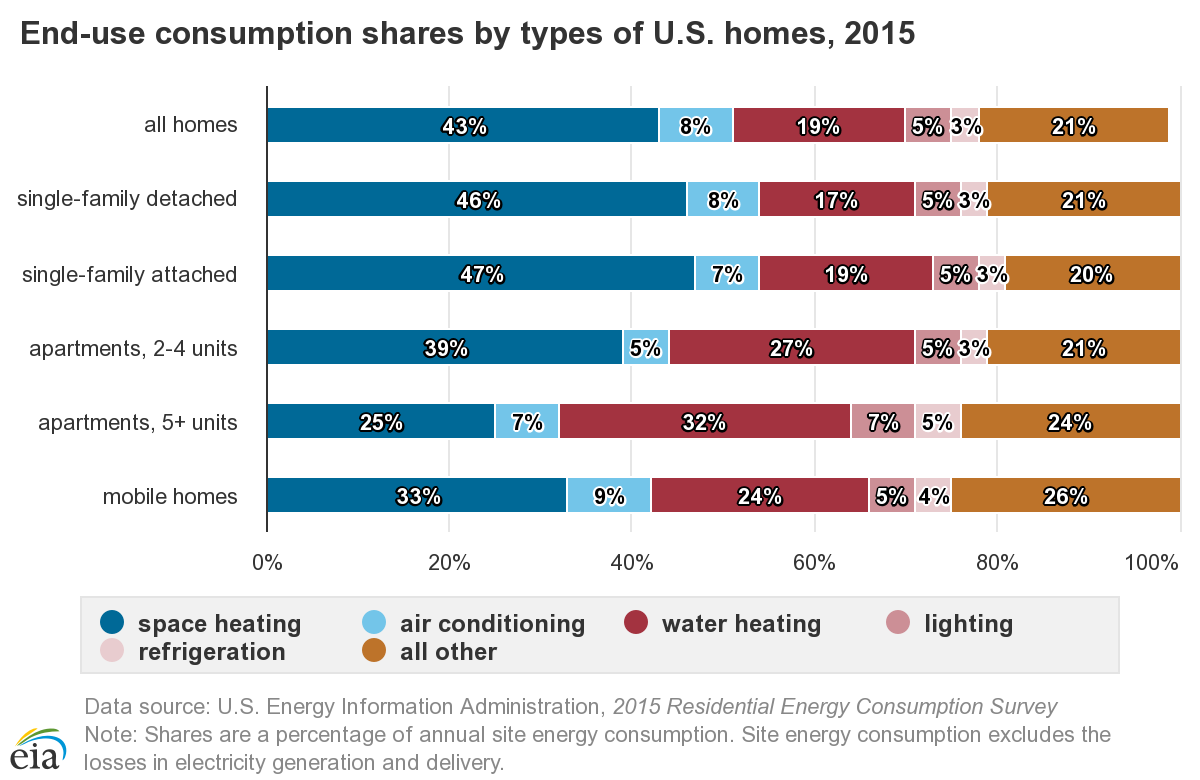AC repair and HVAC maintenance are two great ways to reduce your monthly home expenses. Did you know that home heating and air conditioning systems claim more than half of a family’s energy consumption? Below is a chart from the U.S. Energy Information Administration that reveals how different home types consume energy. You can see that space heating and cooling is where we spend most of our money when it comes to energy expenses.

The good news is that Christmas Air Conditioning & Heating offers its top 10 ways to maintain your HVAC and save money on your monthly energy bills and increase the life of your HVAC unit, saving replacement costs!
Is maintenance really that important?
Absolutely! HVAC systems are more expensive to purchase than ever due to many factors outside of our control and are only going to increase in price. Factors such as manufacturer labor shortages, increase in material costs, supply chain issues, more advanced technology, etc. have turned todays HVAC systems into a decision that costs almost as much as a low-budget vehicle. You should take care of them and treat them as such.
Just like you service your auto-mobile i.e., oil changes, brake checks, alignments, new tires, windshield wipers, etc., you should be caring for your HVAC system the same way. Through the following list we will explore those options, but more importantly we will explain why regular maintenance is a must!
During our maintenance service, we can catch small issues before the become major problems. We can fix a system that doesn’t want to start before the cold weather arrives. We can change and maintain your filters so you don’t have to (saving you undesirable trips to your attic). We’ll also check things like your drain pan and drain lines, to ensure you don’t have a water park come through your ceiling, clear built-up blockage in your fluepipes to prevent house fires and much more.
Top 10 ways to maintain your HVAC and save money
1. Schedule Professional HVAC Preventative Maintenance
Christmas Air recommends two seasonal HVAC tune-ups each year, once in the Spring to check the A/C units and once in the Fall to check the furnace/heater. The cost is $60 per unit per visit. During these maintenance checkups, our technicians will thoroughly service, inspect and troubleshoot the system to keep it working efficiently and prevent breakdowns. The HVAC tech will:
● Clean & Adjust Burner Assembly
● Clean Ignition Assembly
● Examine Heat Exchanger
● Monitor Refrigerant Pressure
● Test Starting Capabilities
● Test Safety Controls
● Check Air Filters & Grills
● Check Blower Components
● Measure & Monitor Air Flow
● Tighten Electrical Connections
● Measure Volt/Amps
● Check Aux Heat Kit
● Lubricate All Moving Parts
● Adjust Thermostat Calibration
● Check & Inspect Evaporator Coil
● Clean Condenser Coil
● Clean Condensate Drains
● Measure Temperature Difference
● Adjust Gas Pressure if Needed
● Check Flame & Pilot
● Monitor AC & Heating Cycles
● Check Duct Work
The service does not include filters. We will change the filters as part of the service if you have them on hand, or you can purchase them from us, but we will need to know in advance of the service so we can bring the correct filter. Upon completing the maintenance service, we email our customer a completed checklist for each unit we maintained. Our customers love this! It is a digital record of what we found and provides any notes the technician made during the maintenance service call.
2. Change 1-inch HVAC filters every 30 days. Change 4-inch HVAC filters every 4-6 months.
When you think about what air filters do to protect your home and health, you will never want to skip a month of changing out your HVAC’s air filter. Filters remove dust, hair, and other contaminants from the air so that these pollutants do not spread throughout your home. Filtration cleans the air and helps reduce airborne contaminants, including particles containing viruses. Beyond improving the air quality inside of your home, changing the HVAC filter routinely or as needed also causes your system to use less energy and saves you money. Clean filters allow more air to pass through, causing the system to use less energy to heat and cool more efficiently at a lower energy cost. For most systems, filters with a MERV rating between 7 and 13 offer an excellent balance between filtration ability and maximum airflow. If you have questions about which filters to buy, ask our technicians when we are out on a maintenance visit or call our office at (469) 919-9928.
3. Visually inspect your HVAC system
Once a month, while you are replacing your filter, briefly inspect your HVAC system to spot any potential problems. Things you can briefly check are the following:
● Check the battery status on the thermostat
● Inspect the condensate system to ensure that it is draining properly
● Ensure that the filter access and cabinet door are securely closed
● Make sure the flue system is securely attached and fully intact
● Ensure that all registers and returns are unblocked and open
● Check all registers for signs of mold
4. Eliminate clutter near the indoor HVAC unit.
Maintaining the space around your indoor HVAC unit improves air quality and safety. The more clutter you have near the unit, the more surface area there is to collect dust, which eventually makes its way into the vent system. Your indoor system needs space for air to circulate. Nearby clutter reduces air circulation and the efficiency of your HVAC system. Plus, clutter can become both a fire and trip hazard, making it harder to perform needed repairs and maintenance.
5. Keep the outside unit clean and clear of brush.
Throughout the year, the outside HVAC unit can easily collect everything from fallen leaves and twigs to grass clippings and other debris. Periodically remove all such debris on and around the unit. Also, trim back nearby brush and trees to at least two feet from all sides of the unit to help maintain proper air flow. When cleaning your system, please remember that it is delicate. You can easily
damage the condenser coils and fins by applying high pressure water or air to them.
6. Regulate your home temperature
HVAC system manufacturers state and design these systems to only be able to maintain temperatures less than or greater than 20 degrees from the outside ambient air temperature. We know that on average they can do more than the manufactures listing. That is not always the case though, and it can strain your system unnecessarily to try to do so. Maintaining your HVAC includes managing indoor temperatures that are comfortable while you’re at home and reducing your HVACs workload while you are away from home or sleeping. Consider installing a programmable thermostat to adjust the temperature at different times of the day. Set your thermostat so that your indoor temperatures are cooler in winter and warmer in summer. This will allow the system to run less frequently, use less power, and last longer.
7. Change the thermostat’s batteries.
Some thermostats are hardwired into the home electrical system. Others are battery-powered and need to be replaced at least once a year to prevent problems. If you are not sure, ask us. We’re here to help!
8. Maintain the carbon monoxide detectors.
We often think blah-blah-blah about the carbon monoxide detectors in our home, but they actually save lives. They have become essential safety devices in our homes. Our HVAC systems use combustion-based energy sources, such as natural gas or fuel oil. In the event of an exhaust leak, impaired ventilation, excess gas flow, or other malfunction, the carbon monoxide devices will sound an alarm to alert you of the danger. These devices have an average working life of about seven years. Read the information that came with your carbon monoxide detectors, or check online to learn how to test the detector and ensure it is working properly. Replace it, if necessary and change the batteries every six months.
9. Monitor your energy bills.
Either a sudden spike or a gradual increase in energy consumption on your monthly invoice could be a sign that your HVAC system has some problem. Schedule a service visit with Christmas Air Conditioning and Heating to have us check out the system. It may be as simple as a dirty filter, but it could also be duct leaks, low refrigerant, failing parts, or other issues that could be causing your system not to function properly.
10. Consider replacing your HVAC system.
The average lifespan of an HCAV system is 12-14 years. If you check your records to calculate the age of your HVAC system, you may find that it’s overdue for replacement. The Department of Energy recommends homeowners replace their HVAC system every 10 to 15 years. Modern air conditioners are durable, but their major components will begin to deteriorate after around ten years, depending on how often you use and maintain them.
Several factors can increase or decrease the life of your HVAC system. These include the type of system, its brand, and how consistent you’ve been in maintaining your system. Fluctuations in our power grid, brownouts, black-outs, and highly inclement Weather will also wear down your system. Diligently caring for your heating and air conditioning system will maximize its working life and maintain higher efficiency throughout its lifetime.
Each year, the energy efficiency of your HVAC system dwindles, almost to the tune of 10% per year, after 10 years of age. Additionally, older HVAC units use a refrigerant known as R-22, which is a type of freon that is outdated and harmful to the environment. Not only has it been “obsolete” since January 2010. It is increasingly harder to find and unbelievably expensive to purchase now. Upgrading to a newer unit will reduce your carbon footprint while cutting down on your monthly energy bills.
When you notice that the old system isn’t as reliable, don’t wait for it to die unexpectedly on the hottest day or coldest night. Plan ahead and replace your HVAC system before it becomes an issue.
Christmas Air is here to help! We have been keeping our neighbors comfortable since 2008. We offer a great annual maintenance plan that you can schedule online and convenient financing options for new systems.

